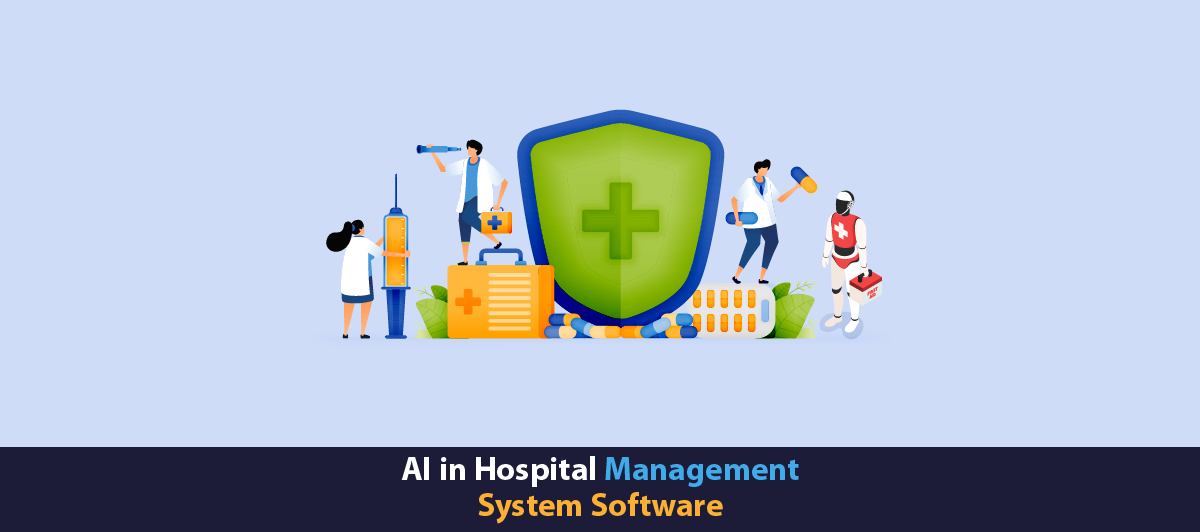How AI act as the best tool for Hospital Management System Software
Quick Summary: Hospital management system software is a game-changer in healthcare. Centralizing patient records; ensures that healthcare personnel has access to accurate; and up-to-date information, enabling them to make well-informed decisions promptly. Continue reading!
Introduction
In the dynamic landscape of hospital operations, efficient hospital management system software is crucial for ensuring optimal patient care delivery and elevating operation efficiency.
Furthermore; Hospital management has become a cornerstone of modern hospital information systems. Hospital management systems provide comprehensive platforms to streamline operations, enhance communication, and improve decision-making processes within the healthcare system.
Furthermore, this well-integrated hospital software provides a wealth of benefits and functionalities. It includes patient registration; appointment scheduling, electronic health records; billing and invoicing, inventory management; and staff scheduling.
Furthermore, by keeping all the vital information on a unified platform. Hospital management software can evade the ineffectiveness of the system; reduce errors, and skyrocket overall healthcare operational efficiency.
Read this blog to understand how embracing artificial intelligence streamlines their day to day operations in the healthcare systems. Also; helps business maximizes their revenue cycle management potential.
Before we dive in the sea of benefits, let’s understand more about hospital management software.
A brief Overview of Hospital management system software
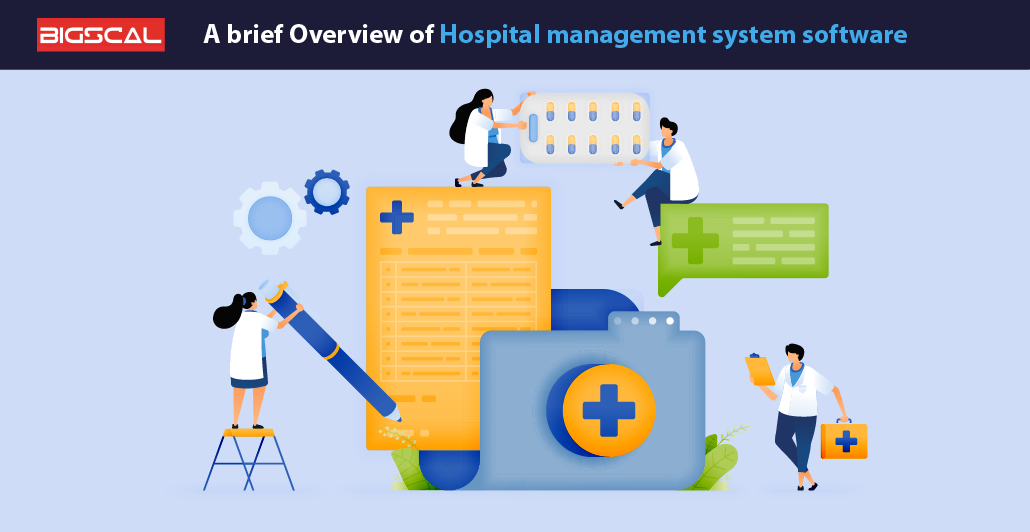
Handling the vast amount of data produced by healthcare organizations requires a potent and versatile platform. Furthermore, hospital management system software provides remarkable ways for clients to handle and supervise all the aspects of administrative tasks. These full-fledged digital healthcare solutions play an integral role in addressing these challenges. By converging various health systems and clinical data and facilitating daily medical operations.
Furthermore, hospital information systems are endowed with features that organize and keep patient information safe.
Medical software assembles data from various medical records; healthcare devices, patient health records, organizational and patient information, and medical documentation. It provides a centralized and efficient platform for data management.
According to Digital Guardian, Hospital management system software improves the productivity of the healthcare industry. It simplifies healthcare policy decision support systems and helps medical centers manage electronic medical records (EMR). Furthermore; By incorporating disparate systems and simplifying communication among medical professionals, Hospital management system software simplifies backbreaking work processes. And, enhances cooperation among health care departments.
Furthermore, medical practitioners can utilize telemedicine; and e-healthcare abilities; extending the reach of medical facility and services beyond traditional limitations.
However, technological advancements come with new responsibilities and challenges. Furthermore; the security of patient data is important, necessitating robust measures to safeguard and protect sensitive clinical information.
Additionally, software for hospital management must comply with legal regulatory compliances such as HL7 and HIPAA to ensure data security and protect medical personnel.
Let’s check out some features of the hospital management system:
Best features of hospital management system software
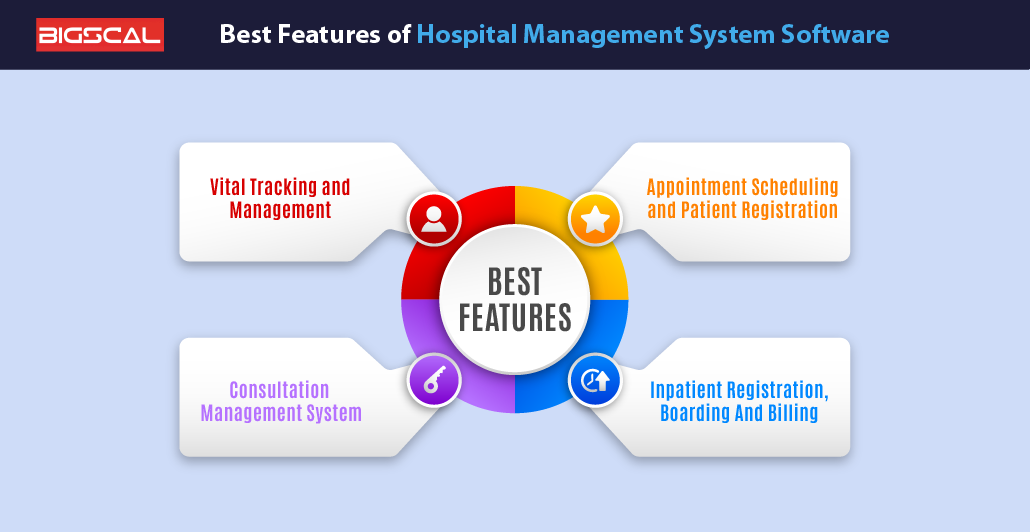
Let’s check out some features of the hospital management system:
Vital tracking and management
Vital tracking is an integral component of Hospital Management System features, ensuring the continuous monitoring and assessment of patients’ vital health symptoms.
Furthermore, hospitals should leverage advanced sensors; and monitoring devices.
Additionally, HMS facilitates comprehensive data management, allowing for trend monitoring and comprehensive analysis.
As a result of this data-driven approach; clinical decision-making is enhanced, early detection of health issues is facilitated, and ultimately better outcomes are achieved for patients.
Appointment scheduling and patient registration
One of the remarkable features of hospital management system software is to schedule appointments online; which eases medical operations. Furthermore, it improves patient experiences.
Furthermore; keeping patient information and demographics such as contact information; lab reports, and diagnostic reports on a centralized server. It eases the onboarding process for new patients, minimizes the workload, and provides an efficient platform to maintain records.
Furthermore, these modern collaboration tool help administrative departments check the availability of beds and other patient needs.
Thus, improving and enhancing the efficacy of hospital management. Authorized users can quickly allocate beds, taking into account factors such as medical requirements and financial constraints.
The hospital management system software also facilitates the management of discharge processes; by providing access to billing information. Also, providing discharge summaries through a centralized platform. In the end, this integration improves patient satisfaction and care by ensuring smooth transitions between phases of care.
Consultation management system
The Clinic and practice management features ease all the operations to manage appointments and handle patients’ online process. Furthermore; With just a few clicks, doctors can easily check patients’ visits. And easily schedule appointments with patients on their mobile devices
Patients have the flexibility to seek assistance from a medical specialist, whether it’s a dentist, urologist, or any other medical expert.
This full-featured hospital management system software has an adept team of medical staff; catering to various individual patients’ needs. Whether it’s for viral fever, dry coughs, or any other medical conditions and ailments.
Moreover, the hospital management system software; provides a convenient platform for accessing a diverse pool of healthcare providers. To secure an appointment, patients no longer have to go through protracted wait times. Online appointment booking saves them time and ensures prompt access to healthcare.
The Clinic Administration System’s appointment management feature facilitates seamless interactions between patients and healthcare professionals, facilitating access to quality healthcare as a whole.
Inpatient Registration, Boarding And Billing
The implementation of the hospital management system software provides a comprehensive solution. To organize patient data, including patient demographics like title, age, and contact information.
Furthermore, this well-integrated hospital management system software eases the onboarding of new patients. And, eases the intricate steps of the registration process, even when entering the details in the system.
Moreover, the hospital management software system provides a centralized platform for managing discharge-related tasks; including information dissemination, laboratory tests; billing, and discharge summaries, streamlining the operations of the discharge process.
This user-friendly framework eases every intricate step of hospital management; from determining the cost to room allocation; and surgical procedures.
Furthermore, it provides clear information about bed availability; and stock management which remarkably improves the hospital management process. Furthermore; authorized personnel can effectively provide information; about beds based on patient needs and financial considerations.
The best benefits of hospital Management system software
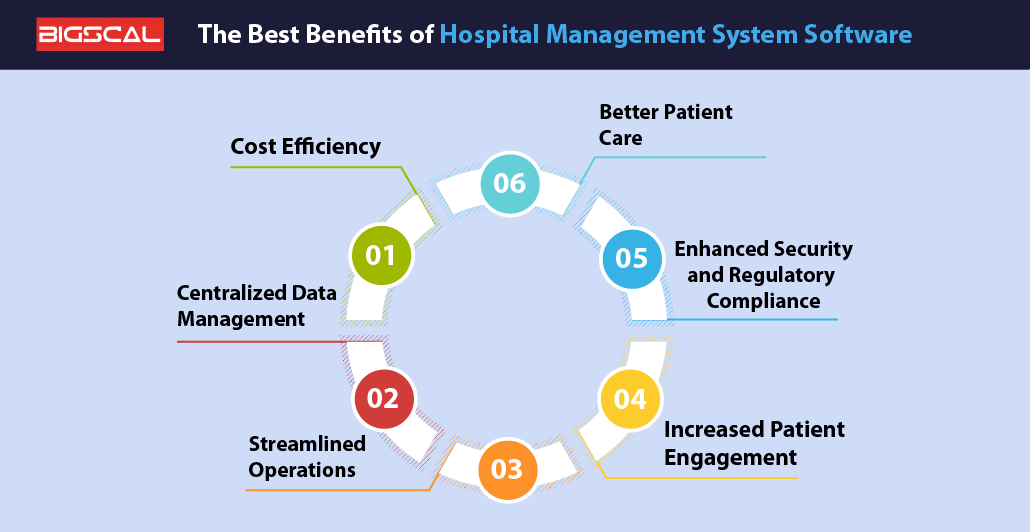
HIS frameworks reduce costs related to data administration and boost effectiveness. As a result, it is easier to move talent forward in order to meet the dynamic needs of the medical industry. let’s check out some benefits of hospital management system software:
1. Cost Efficiency: The hospital management software system streamlines all the manual routine tasks; and medical billing processes. Further; it optimizes all the intricate steps of resource allocation and helps doctors provide better care to patients. Furthermore; It provides remarkable ways for clients to reduce expenses by curbing the additional cost of carrying out day to day operations. Additionally; streamlined processes help you lead the hospital in the right way and make tangible decisions.
2. Centralized Data Management: hospital management systems keep patient records, treatment plan reports; medical histories, bed management; test results, and other information in a centralized portal. Furthermore; providing healthcare professionals with instant access to accurate data and helping them to maintain records seamlessly.
3. Streamlined Operations: Hospital management software streamlines manual administrative tasks such as scheduling appointments; patient management, registration, billing, and inventory management; reducing manual errors and improving overall efficiency.
4. Increased Patient Engagement: Healthcare management software provides patients with online access to their medical records, scheduling appointments; and interacting with healthcare providers through patient portal or mobile applications. As a result, the care process becomes more engaging and collaborative.
5. Enhanced Security and Regulatory Compliance: Hospital management software; provides reliable ways to clients to keep the system secure and adhere to encryption standards such as HIPAA (Health Insurance Portability and Accountability Act). Furthermore; embracing Advanced encryption techniques and access controls helps hospitals ensure patient safety; and keeps the system away from unauthorized access or violations.
6. Better Patient Care: The use of hospital management system software; improves the quality of patient care by enabling efficient coordination among healthcare teams. In order to ensure timely and personalized care; it is necessary to have quick access to patient records, medication histories, and treatment plans.
How Artificial Intelligence helps the firms to get the best result
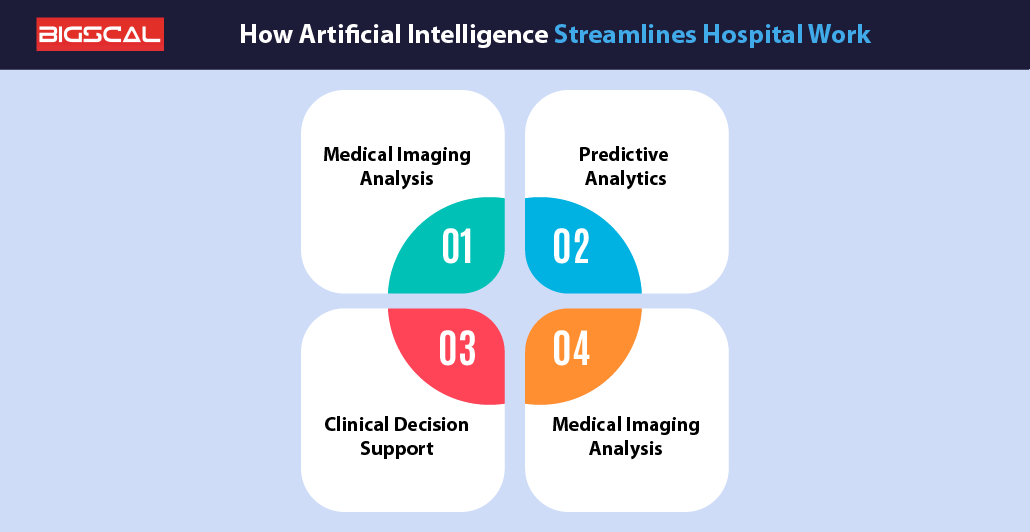
Let’s find out:
Clinical Decision Support
By using AI-powered clinical decision support systems; doctors can easily get useful insights and recommendations. Furthermore, they can easily follow the medical guidelines and implement them in their practices. By providing timely and relevant information; AI provides viable insights to doctors to reduce diagnostic errors. Also, improve patient health outcomes.
These best hospital management software systems; interpret patient clinical data and diagnostic data, and medical histories. And research findings to help doctors understand the diagnosing symptoms; select appropriate treatment options, and check the patient’s progress status.
Medical Imaging Analysis
Medical imaging analysis is being revolutionized by AI technologies that automate the interpretation of diagnostic images such as X-rays; MRIs, and CT scans. With AI-powered imaging analysis, radiologists can perform diagnostic workflows more efficiently, reduce their workload, and expedite the interpretation process.
The use of deep learning algorithms can aid radiologists in diagnosing and treating patients with high accuracy.
Predictive Analytics
AI provides a wealth of benefits to hospitals and helps them impose tangible strategies in the system. Furthermore, leveraging predictive analytics in hospitals helps doctors; make accurate treatment decisions.
By using predictive analytics, hospitals can, for example; predict patient admission rates. Thereby optimizing their staffing levels and reducing wait times.It is possible to detect health issues earlier, develop tailored treatment plans for them.And allocate resources more efficiently when using this predictive capability.
Further, allows healthcare specialists can easily understand patient needs and trends more accurately. Machine learning algorithms; assemble data from various sources including patient records, laboratory tests, CT scans, diagnostic images, and genetic information. Therefore, it analyze the patterns and detect all the disease symptoms.
AI-Powered Imaging Analysis in Disease Detection
AI in Healthcare industry is transforming the way of detecting health diseases. Furthermore, by automating the interpretation of diagnostic images such as MRIs, X-rays, and CT scans. Further, by embracing deep learning algorithms, doctors can detect abnormalities, tumors; and other critical findings. Furthermore, helping radiologists streamline their treatment plans; and detect diseases at an early stage.
AI-powered imaging analysis expedites the initial steps of the interpretation process; reduces the workload on radiologists. And improves the efficacy of diagnostic workflows.
Try the best hospital management systems software with Bigscal!
With Bigscal’s cutting-edge software solution, hospital management reaches new heights. Our best hospital management software provides comprehensive features to minimize the stress related to administrative tasks; optimize resource allocation, and enhance patient care.
Bigscal offers a seamless, simple-to-use platform that is designed to satisfy the specific requirements of healthcare organizations; ranging from patient registration and appointment scheduling to advanced analytics and clinical decision support. Put your trust in Bigscal for better patient outcomes, streamlined processes, and effective operations. Partner with Bigscal to improve the hospital administration experience right now!!!
Conclusion
Hospital management software features provide a remarkable platform to hospitals for modern healthcare delivery. Furthermore, it also needs to be flexible enough to keep up with the quick speed at which technology is developing.
For these systems to be reliable in their use, data must be accurately and securely stored. They protect patient privacy and confidentiality by enabling quick and easy access to data while blocking unauthorized access.
The hospital information system is essential to streamline the workflow of the healthcare department. There may be a considerable improvement in patient outcomes, fewer medical errors, and a higher standard of care overall.
Additionally, by offering a single platform, HIMS helps healthcare professionals communicate better, automate tedious activities, and work more efficiently.
FAQ
What are the primary reasons hospitals utilize Hospital Management Systems software?
Hospitals use Hospital Management Systems software to streamline administrative tasks; improve patient care delivery, enhance operational efficiency, ensure data security, and maintain regulatory compliance.
What are the benefits hospitals gain from implementing a hospital management software system?
Hospitals get a wealth of benefits from embracing hospital management software, such as improved efficiency, enhanced patient care, streamlined operations, better decision-making, cost savings, data security, regulatory compliance, and increased staff productivity.
How does a hospital management software system simplify the administrative processes within a hospital?
Hospital management software systems automate tasks such as appointment scheduling; patient registration, medical bills, and inventory management; reducing errors, improving efficiency, and freeing up staff time for other responsibilities.
How does the integration of electronic health records (EHRs) enhance the functionality of a Hospital Management Software System?
Integration of Electronic health records (EHRs) into hospital management software systems centralizes patient data; improves data accuracy, facilitates seamless information exchange, enhances clinical decision-making; and optimizes patient care delivery.
How does a hospital management software system enhance the efficiency of medical billing and revenue cycle management?
Hospital management software systems automate billing processes; verify insurance eligibility, streamline claim submission, track payments, and manage revenue cycles, decreasing errors, improving cash flow, and enhancing financial performance.
